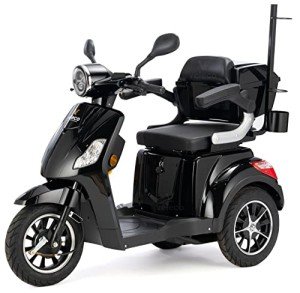What Is The Future Of Mobility Scooter Be Like In 100 Years?
Understanding Mobility Scooters: A Comprehensive Guide
Mobility scooters have actually ended up being a vital tool for people who face mobility obstacles, providing self-reliance and a way of transportation. They are created to assist users in navigating different surfaces, whether inside or outdoors, allowing them to engage more completely in daily activities. This post will explore the kinds of mobility scooters, their functions, benefits, and factors to consider for potential users.
What is a Mobility Scooter?
A mobility scooter is a motorized lorry made for individuals with physical limitations. It assists users preserve their mobility and self-reliance, offering an effective methods of transportation over short ranges. While electric mobility scooter uk might look similar to small electric vehicles, mobility scooters are typically powered by batteries, with controls developed for ease of use.
Types of Mobility Scooters
There are numerous types of mobility scooters readily available in the market, each designed to deal with various requirements and choices. Here's a breakdown of the most common types:
Type of Mobility Scooter
Description
Best For
Three-Wheeled Scooters
These scooters use exceptional maneuverability and small turning radius but may do not have stability.
Indoor usage and tight spaces.
Four-Wheeled Scooters
Typically more stable than three-wheeled designs, these scooters are ideal for outdoor usage.
All-terrain travel and outdoor activities.
Portable Scooters
Lightweight and foldable, these scooters are developed for easy transportation.
Travelers and people with limited storage area.
Heavy-Duty Scooters
Built for larger users, these are robust and can manage much heavier weights, frequently equipped with much better battery life.
Users needing additional support and stability.
Feature-Rich Scooters
These might include sophisticated innovation such as Bluetooth connectivity, integrated GPS, and adjustable seating.
Tech-savvy users trying to find convenience and convenience.
Secret Features of Mobility Scooters
When selecting a mobility scooter, purchasers should think about several vital features. The following list details critical aspects that can considerably affect their experience:
- Weight Capacity: Understanding the scooter's weight limit is essential to ensure safety and performance.
- Battery Life: A longer battery life translates to more prolonged use in between charges, which is vital for lengthy trips.
- Speed: Typical mobility scooters can reach speeds between 4 to 8 miles per hour, however it's important to select one that fits the user's requirements.
- Convenience: Look for adjustable seats, armrests, and back-rests that enhance the overall riding experience.
- Portability: If taking a trip regularly, a lightweight and collapsible scooter is useful.
- Surface Capability: Some scooters are much better geared up for rough surfaces, while others work best on smooth surface areas.
Benefits of Using Mobility Scooters
Mobility scooters offer numerous benefits that can significantly enhance users' lifestyle. These consist of:
Increased Independence
Lots of individuals who struggle with mobility count on household or caregivers for transportation. Mobility scooters empower users to move about easily and carry out errands by themselves, cultivating a sense of independence and self-sufficiency.
Boosted Quality of Life
Having the capability to take a trip unassisted can lead to social engagement, improved psychological well-being, and overall much better quality of life. Users can take part in social activities, check out family and friends, and explore their communities.
Cost-Effectiveness
Compared to other mobility help or services, mobility scooters can be more cost-effective. They can eliminate the need for pricey changes to homes or dependence on transport services.
Adjustability and Customization
Lots of mobility scooters feature choices for customization, ensuring that users can customize them to best fulfill their specific requirements.
Considerations Before Purchase
Before choosing on the ideal mobility scooter, potential buyers should keep these considerations in mind:
- Lifestyle Needs: Assess how the scooter will fit into day-to-day regimens, consisting of the frequency and areas of use.
- Trial Rides: If possible, taking a couple of models for a test drive can assist gauge convenience and maneuverability.
- Spending plan: Costs can vary widely, so specifying a spending plan upfront is vital.
- Warranty and Service: Always think about the warranty provided and the availability of customer support in case of repairs.
FAQs About Mobility Scooters
1. How fast do mobility scooters go?
Mobility scooters typically vary from 4 to 8 miles per hour, depending on the design and its power capability.
2. Are mobility scooters covered by insurance coverage?
Lots of insurance coverage plans might cover part of the expense if a physician recommends the scooter; nevertheless, policies vary significantly.
3. Can I drive a mobility scooter on the road?
This depends upon local laws and guidelines. In some locations, mobility scooters might be allowed on public roadways, while in others, they are restricted to walkways and paths.
4. For how long does the battery last?
Battery life normally depends upon the scooter design and type of use. Common mobility scooter batteries can last anywhere from 6 to 12 miles on a single charge.
5. Are mobility scooters safe?
Mobility scooters are typically safe when used appropriately. It's necessary to acquaint oneself with the controls and run them properly.
Mobility scooters play an important role in the lives of people with mobility challenges. By comprehending the types, features, benefits, and considerations associated with these cars, users can make educated options. This can lead to increased independence, a better lifestyle, and renewed access to the world around them. Whether for social outings, errands, or leisure activities, a mobility scooter can be a life-changing financial investment for lots of individuals.
